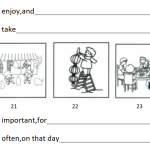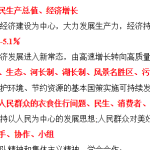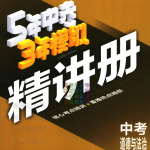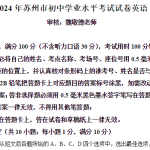中考英语答题技巧
一、听力理解的解题技巧
中考英语听力测试部分在整套试题中占有重要地位。它要求大家从头到尾按顺序往下听,在有限的时间内做出选择,没有“回头看”的余地。因此大家学习一些应试技巧和解题的基本方法是很有必要的。
一、听力应试策略
听前:略读题目,切入话题,划出重点,预测内容(确定人物身份)
听中:捕捉信息,速记要点,有的放矢,去伪存真(短文独白,首末为主旨句,注意5W,1H)【when,where,what/which,who,why,how】
听后:连贯记忆,前后联系,综合考虑,一锤定音。
二、快速记录能力
心记:这种能力对于解决听力第1节的问题非常适用。笔记:
1)运用速记符号例如:↑up↓down ←left →right =equal
2)发明并运用字母的缩写形式ex—expensive lg—large eq—earthquake
三、听力预测技巧
1.对话预测:在听取对话,尤其是Part1-5——Short Conversation时,考生可以按照下例wh-问题进行预测:
Who are the two speakers?
What is the possible Relationships between them?
When did they have the conversation?
Where did the conversation take place?
Why do they have the conversation?
What did they plan to do?
依靠开篇句预测:英语听力的第一句话通常会透露整篇的主题,所以大家要善于抓住听力材料的首句信息。
四、听力高分应试策略
[题材特点]
听力材料一般来源于实际生活,涉及到现实生活的方方面面,如日常生活、文化教育、传说、时事、人物、科普等。对话一般围绕一个日常生活的话题展开。如:购物、买票、道别、感谢、打电话、约会、偏爱、祝愿和祝贺、提供帮助、请求、问路、看病、求救等。
[考查热点]
1.语境判断:对话者身份、所处地点、情绪、天气状况等。
2.数字推算:电话号码、出生日期、金钱数字、路程距离、时间长短等。
3.行为预测:对话者谈话的主题,以及将要去干什么。
4,细节推断:事情发生的时间、地点、原因、经过、结果等。
5.对话涉及话题:计划打算、工作学习、购物、旅游、看病、生日、体育、求助等。
1.领略主旨大意,概括话题内容
这类试题在中考听力试题中约占1小题,它要求我们对听到的内容有一个整体的把握和全面的领会,抓住说话者究竟在说什么。任何一段对话或独白都是围绕一个中心展开的,有时主旨大意较明显,有时则需要归纳、概括。常见的提问方式有:
What’s the passage mainly about?
What’s the topic of the passage?
What are the two speakers doing?
What are the two speakers talking about?
What is the dialogue/conversation about?
2.捕捉主要细节,确认具体事实
这类试题在中考听力试题中约占8小题。它要求我们听清、听懂与话题中心相关的具体信息,准确理解具体细节,如时间、地点、人物、价钱、数量、目的、原因、结果等。同时,还要求我们对所听到的信息进行简单的处理,比如数字运算、时间顺序、比较筛选、同义转换、因果关系等。理解具体信息有助于把握话题内容,领会说话者意图,这是听力考查的重点内容。常见的提问方式有:
Where is the woman going?
How does the man pay for the tickets?
What’s wrong with the girl?
When does the woman plan to arrive?
What’s the man’s house number?
How many hours does Tom sleep a day?
Why does the man thank the woman?
Which of the following is true?
3.推测谈话背景,辨认角色关系
这类试题在高中听力试题中约占5小题,要求我们从谈话或说话的话题和语气来推断出对话双方(或说话人)的职业身份,彼此之间(或与他人)的关系,对话发生的时间、地点或场合等。常见的提问方式有:
Where does this conversation take place?
Where is the woman speaking?
Where did the conversation most likely happen?
When does the dialogue take place?
Who do you think the woman probably is?
What’s the probable relationship between the speakers?
4.领会弦外之音,揣摩观点意图
这类试题在高中听力试题中约占5小题,它要求我们从话语中听出其中可能有的“弦外之音”,也就是揣摩说话人的意图、观点或态度等,常见的提问方式有:
What can we learn from the conversation/speakers?
What can we know /learn about the woman?
What does the man mean?
What does the speakers want to tell us?
What is the probable result of the conversation?
五、听力场景词汇总结
高考考试的对话内容场景基本上都是考生所熟悉的,有校园、生活、工作、各种社交场所。了解一些场景下的常用语和常见表达对解题是很有帮助的。对这些常用词汇和短语不仅要知道其本身的意思,还要知道它们的同义表达方式。这是因为现在听力试题一般不会在选项中出现对话中的原词和词组。以下场景是对话当中所占比例最大的,掌握了这些场景下的常用短语和表达方式,也就从词汇和短语方面抓住了解题的关键。
1.餐馆场景
order点菜;serve上菜;change零钱;Keep the change!不用找零钱了!tip小费;treat请客(This is my treat!我请客!);go Dutch AA制 (Let’s go fifty fifty.) ;steak牛排;cheese奶酪;sandwich三明治;bacon腌肉;soup汤;plain water自来水(西餐中洗手用的);dessert甜品,水果(作为正餐的最后一道);go out for dinner / dinner out出去吃饭;snack bar小吃街,大排挡;hamburger汉堡包;coke可口可乐;French fries炸薯条;dining hall食堂;coffee shop咖啡店;restaurant餐馆;cafeteria自助餐厅或食堂;canteen食堂.
2.邮局场景
stamp envelope package 包裹;overweight超重;extra postage额外邮资;send / post / deliver a letter /mail寄/发信;express mail快件;airmail航空信件;surface mail陆地邮寄;open an account开一个账户。
3.图书馆场景
library card;borrow;lend;keep;renew续借;bookshelf;novel;science fiction科幻小说;magazine;reference book;librarian图书管理员;pay a fine交罚款;Can I help you? / What can I do for you?
4.医院及健康场景
aspirin 阿司匹林;regular doctor私人医生;emergence department急诊室;ICU (= intensive care unit)特护病房;treatment治疗手段;take one’s temperature / blood pressure测量体温/血压;medicine/pills /tablets药丸/药片;heart attack心脏病;cold / flu流感;have/ catch a cold;pain;headache;stomach-ache;backache;sore-throat喉咙痛;cough; fever;What’s up?(多用于男生之间)How is it going? How are you?回答:I’m fine./ I feel good/ terrific./ I couldn’t be better./ Nothing is very wrong with me.好。I am not feeling good./ I feel terrible/horrible/awful./I am not myself these days.不好。(注意听语气:身体好的时候,语调上扬,语气非常欢快;身体不好的时候,降调,语气非常郁闷。)
5.电话场景
operator接线员;Extension six two two six, please.请转 6226。The line is bad / busy / engaged.It kept a busy line.电话占线。long distance call长途电话;collect call对方付费的电话;put through接通电话;hold on / up;Hold the line, please.Hello! This is…speaking.Who’s speaking? / who is this? call / telephone / ring / phone sb.;give sb.a call / ring;I’ll call back later / again.I’ll ring him / her up again.I couldn’t get through.Sorry, I’m afraid you have the wrong number.
6.酒店场景
make a reservation预订房间;reception desk接待处;check in人住;check out结账;single room单间;suite 套间;Do you have a reservation, Sir? Have you got any vacant room? (=Is there any room available here?)有空房间吗?All the room are occupied.房间已满。Can I have a suite please? How much do you charge for that? Smoking or no smoking? Meals included.包括饮食。Can I show you your room? / Can I carry your luggage?
7.超速场景
speeding;May I see your license, please? You will be fined by $20.
8.购物场景
store杂货店;department store百货商场;shopping center购物中心;
商品信息:size;color;style;price;What color/size/kind do you want?商品论贵贱:expensive, cheap;价格论高低:high, low;bargain便宜货;popular /fashionable流行的;in fashion流行,时尚;out of fashion过时的;brand品牌;counter柜台;pay in cash用现金支付;pay in check用支票支付;credit card 信用卡;shop assistant 商店营业员;out of stock脱销/缺货;in stock有货。





